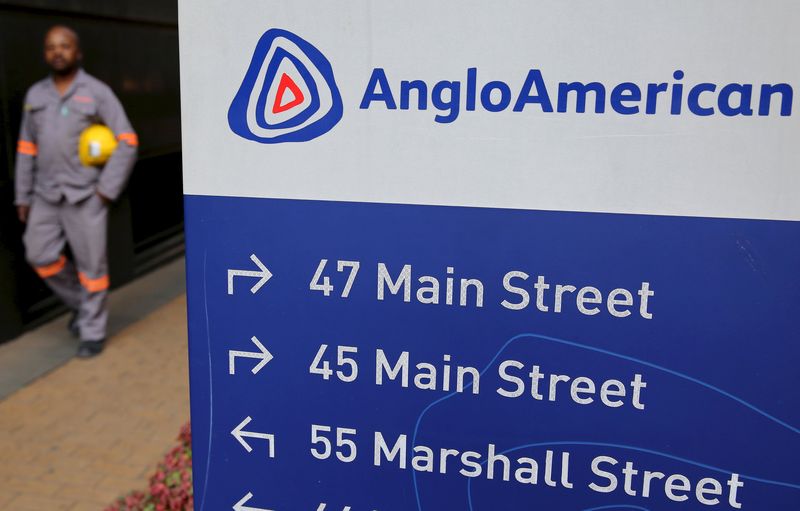* Anglo hurt by loss-making platinum assets
* May follow Glencore precedent on dividend to curb debt
* Company says next dividend review due in February
* Rio, BHP vow to maintain progressive dividend policy
By Olivia Kumwenda-Mtambo and Freya Berry
Sept 10 (Reuters) - Anglo American AAL.L is likely to be
the next mining firm to follow Glencore's GLEN.L example in
cutting its dividend to help contain debt levels and preserve
cash amid a global commodity market slump, analysts and bankers
said.
Glencore, weighed down by net debt of $30 billion and hurt
by declines in its key products of copper and coal to six-year
lows, this week suspended dividends and said it would sell
assets and raise $2.5 billion in a share sale. ID:nL5N11D0O4
The rout in commodity prices is putting pressure on credit
ratings and dividends across the mining sector, prompting
reductions in capital expenditure, operational costs and jobs.
Among Glencore's big mining rivals, Rio Tinto RIO.AX
RIO.L and BHP Billiton BLT.L BHP.AX have both reaffirmed
their commitment to paying a dividend, but Anglo is seen as more
vulnerable due to its higher-cost iron ore assets, loss-making
platinum assets and slower than expected progress with its
restructuring plans.
"We have seen Teck cut their dividend, we have seen Glencore
cut their dividend and I think we will see Anglo American cut
their dividend," Bernstein Research analyst Paul Gait said.
Canadian miner Teck Resources TCKb.TO TCK.N announced a
67 percent cut in its dividend in April, citing weakening
Chinese demand for steel-making coal. ID:nL4N0XI3LJ
"Given the set of commodities that they (Anglo) have got,
their ability to pay a dividend without raising their debt is
harder than for any other mining company," said Gait, a view
echoed by two sector bankers.
Anglo spokesman James Wyatt-Tilby said the company board
made dividend decisions every six months, with the next review
set for February. He gave no further details.
Anglo, the fifth-biggest diversified global mining group by
stock market capitalisation, said in July it would cut about
6,000 jobs and might put up more assets for sale as the slump in
metals prices dragged its share price to 13-year
lows. ID:nL5N1040T1
Anglo's total borrowings were at nearly $19 billion at the
end of June, putting its debt to equity at 0.86 times, according
to Thomson Reuters data. This compares to a debt to equity ratio
of 0.59 times for Rio Tinto and 0.48 times for BHP Billiton.
PLATINUM WORRIES
Anglo's big exposure to labour-intensive and loss-making
platinum assets has been of particular concern to investors.
The company's platinum subsidiary Amplats AMSJ.J said on
Wednesday it had sold its labour-intensive South African
Rustenburg mine, which produces about a third of its annual
output, to bullion producer Sibanye Gold SGLJ.J for 4.5
billion rand ($326 million). ID:nL5N11F0OP
Sector bankers said Anglo needed to show it was sticking to
its plan to trim its debt and the deal with Sibanye showed the
company was committed.
Anglo posted a steep fall in first-half profit and said the
next six months could be even worse, but it still declared an
interim dividend.
"They're reviewing what to do on their final one. They may
decide against paying one," a London-based sector banker on the
advisory side said.
Anglo shares plunged last month to 649 pence, their lowest
in 15 years, but have since staged a slight recovery. They were
trading down 2 percent at 727 pence as of 1100 GMT.
But the shares, trading at 11.5 times forward
price-to-earnings ratio, are at a 16 percent discount to its
mining peers.
Glencore's decision to suspend its dividend was well
received, with its shares also recovering from record lows.
"Clearly Glencore has set a precedent. The reality is that
you've got to have strong confidence in commodity prices to be
able to have a progressive dividend," another banker said.
"Just paying dividends for the sake of it - increasing net
debt to pay a dividend - is just stupid."
BENEFITS
Ratings agency Fitch said Glencore's decision highlighted
the benefits of a flexible dividend policy.
"This option would not be open to Rio or BHP unless they
dropped their progressive dividend policy, which would be
difficult because of its popularity with shareholders and
because of the emphasis that both companies have put on the
policy," Fitch said.
Under a progressive dividend policy, dividends gradually
increase as a percentage of profit.
Fitch said Rio and BHP have been able to stick to their
dividend policies, despite the fall in iron ore prices, because
they cut costs often more than their own targets, but it warned
that further cost reductions would be much harder to achieve.
BHP last month reaffirmed its pledge never to cut its
dividend and lowered its target for capital spending for the
year to June 2016 to help meet the promise.
"Our commitment to our progressive dividend is resolute,"
Chief Executive Andrew Mackenzie said last month. "It has
withstood many previous cycles and is a key differentiator
relative to our peers."
Keeping to board policy, Rio lifted its interim dividend by
12 percent to $1.075 per share, despite a dismal outlook for
commodities. It pledged $1 billion in cost cuts this year.
Both BHP and Rio said their positions on progressive
dividend policies had not changed.
($1 = 13.8237 rand)
